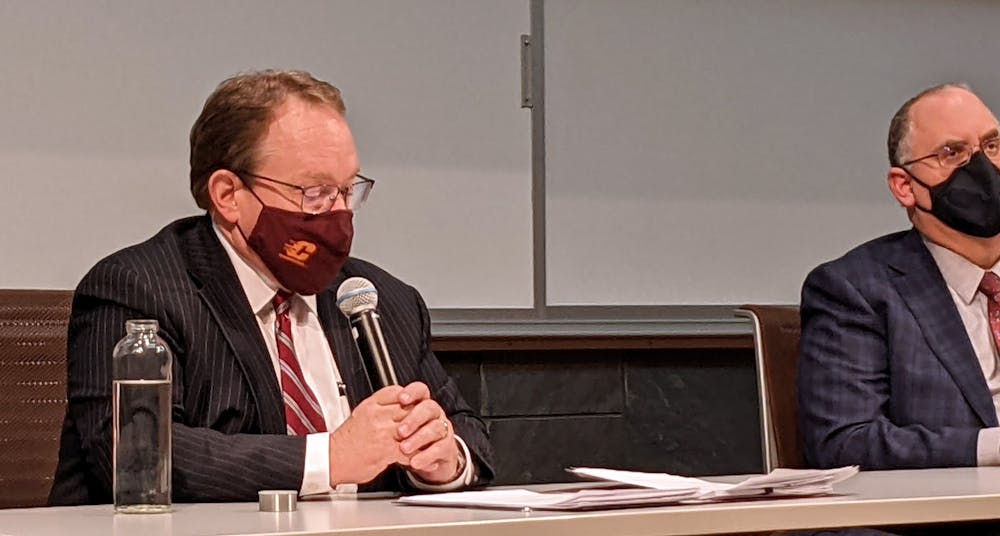SGA president criticizes Honors Program report, administrators at Academic Senate
The Academic Senate heard a statement and questions about issues with the Honors Program from the Student Government Association president.
Newly elected SGA President Taylor Idema addressed a recent report on Central Michigan University's Honors Program. She also read a list of nine questions from honors students about the report.
“Since Fall 2020, when new leadership took over in the Honors Program,” Idema said, “Honors students have had major concerns with what appears to be the secretive and systematic destruction of our nationally recognized honors program.”
Included in Idema’s list of concerns was the removal of two associate director positions and the academic advisor of the program. She also said two office professionals resigned and two of 12 student workers returned in Fall 2021.
Idema said the removal of the two associate directors was a “ruse” by Honors leadership to reorganize the program after staff raised concerns about the state of the program.
According to Idema, changes to the Honors Program’s requirements must be approved by the Honors Council, the Undergraduate Curriculum Committee and the Academic Senate. Honors Council Chair Bob Dvorak said one of the minimum GPA requirements for admitting honors students was changed without a vote or review from the Honors Council but was properly approved the next academic year.
Honors Program Director Nicole Barco, former Provost Mary Schutten and former Senior Vice President for Academic Affairs Julia Johnson were named by Idema as administrators who changed the program’s policies without working through the required systems.
One of the observations in the report said there was “insufficient evidence” to support a claim that workplace violence, as defined by CMU policy, occurred in the Honors Program office on April 1, 2021.
President Bob Davies said the incident involved “raised voices and slamming doors” in the Honors Program office. Davies said the event was not viewed as a “toxic work environment” because the incident was filed as a report of workplace violence. Idema and Senator Will Anderson questioned the handling of the situation.
“Why did the report choose to call the threatening and bullying behaviors involved in the April incident workplace violence,” Idema said in her statement. “Was it so that they could say workplace violence did not occur even though an employee was harassed, berated, and bullied for nearly an hour?”
“And why did the report not mention that that person who did the harassing and bullying—Julia Johnson—is no longer employed at CMU?”
Anderson asked why the report is being released now if it was finished in October 2021. Davies said a draft of the report was created at that time but was not finalized until February 2022.
Senator Martha Frank asked why administrators were chosen to lead the examination instead of a third-party “impartial” firm. Frank referenced the investigation of three journalism staff members, which used an external firm.
Mary Martinez, interim executive director of the Office of Civil Rights and Institutional Equity, and Beth Timmerman, director of Internal Audit, were charged by CMU to lead the examination.
“It seems to me that what we had here was administrators investigating other administrators,” Frank said. “I don’t see how that can be anything but biased.”
Davies said he saw no conflicting interest with how the examination was carried out because examinations like these are part of Martinez and Timmerman’s positions.
Senate Chair Katrina Piatek-Jimenez read a statement from a member of the Honors Council, which said the council has not voted to endorse the report. She also said Davies has been invited to the council’s April 25 meeting to answer questions about the report.
Interim Provost Richard Rothaus said a later meeting will be needed to address the questions in Idema’s statement because there were “far too many questions, far too fast” to answer during the senate’s meeting. Davies also said he would be open to meeting with Idema next week to answer her questions.
Piatek-Jimenez said the discussion should be held during a senate meeting or at a public forum.
“Every single question that Senator Idema has just read off are questions I’ve heard at least a dozen times from members all over the CMU community,” Piatek-Jimenez said. “These are not questions that Idema has, these are questions that every single faculty, student and staff that has ever touched the Honors Program have.”
Idema said she wants the discussion to be public so more people can attend. She said she was not happy with Davies and Rothaus’ responses at the senate meeting.
“I was hoping for some clear, real answers,” Idema said. “I was not happy with responses (Davies) gave and I was really not happy with response the provost gave. He seemed to be talking down to me by saying it was too much and too fast. I really didn’t appreciate that. Hopefully this will open up some channel for clear communication and dialogue moving forward.”
Idema's full statement and list of questions can be viewed below:
Other news
The senate also discussed proposed revisions to CMU's Student Opinion Survey (SOS). According to Senator Brad Swanson, one purpose of the changes is to reduce the chances for student bias in responses.
Piatek-Jimenez said many of the questions are prone to bias, especially for faculty who are women, underrepresented minorities or have accents.
"So many of our current questions in the SOS are susceptible to bias," Piatek-Jimenez said. "They are basically different phrasings of 'do you like your professor?' The research shows that those are the types of questions that bias floods."
The new survey, if approved, would hopefully be analyzed for several semesters to see if it reduces biased responses, Piatek-Jimenez said.
Academic Senate meetings are held at 3:30 p.m. bi-weekly on Tuesdays in the French Auditorium. Livestream and recording links can be found on the senate website.
The next and final meeting of the semester will be at 4 p.m. on May 3.




